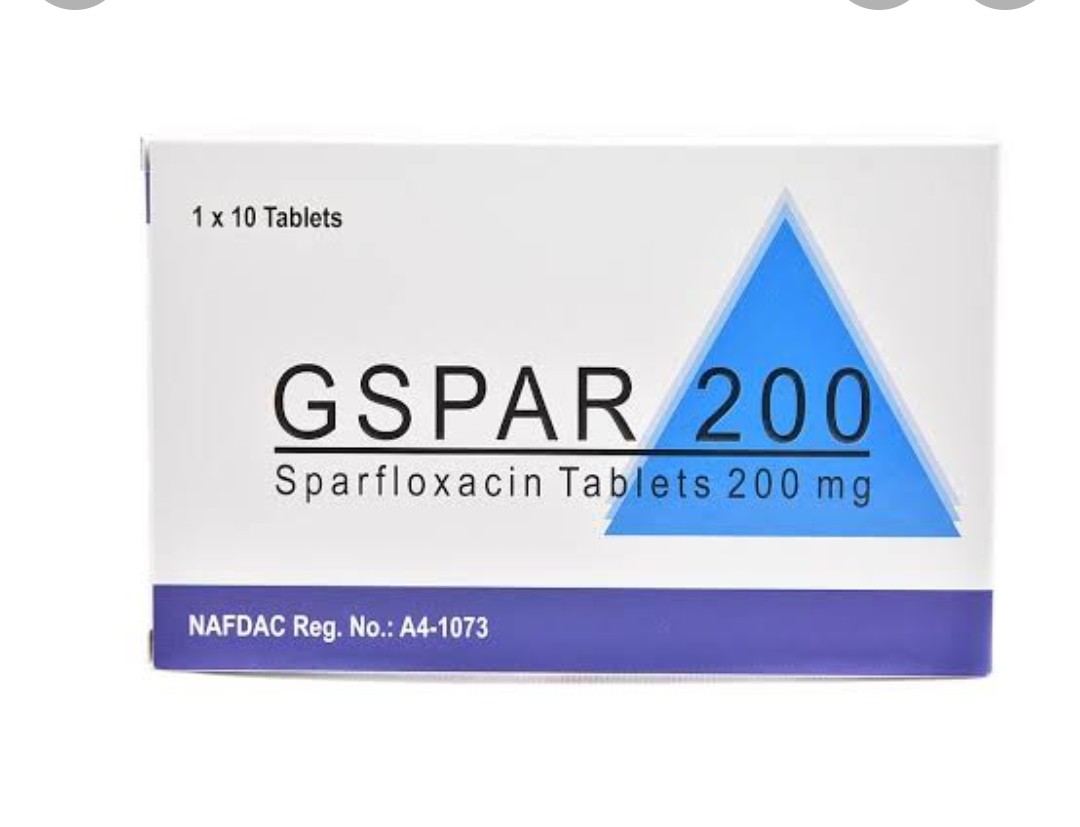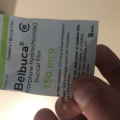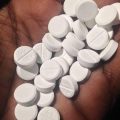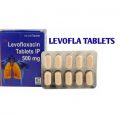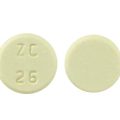What is GSPAR 200 for?
GSPAR 200 is a brand of sparfloxacin an antibiotic in a class of drugs called fluoroquinolones primarily used to treat or prevent certain infections caused by bacteria. It is used to treat infections of the nose, throat, urinary tract, lungs (pneumonia), skin, and soft tissues. A bacterial infection is a condition in which bacteria grow in the body and cause infection. It can target any body part and multiple very quickly.
Fluoroquinolones are useful in treating or preventing bacterial infections including the following:
- Chlamydia Infections
- Escherichia coli Infections
- Haemophilus Infections
- Klebsiella Infections
- Pneumonia
- Proteus Infections
- Salmonella Infections
- Staphylococcal Infections
- Streptococcal Infections
This medication may be prescribed for other uses. Ask your doctor or pharmacist for more information. Other fluoroquinolone antibiotics include ciprofloxacin (Cipro), gemifloxacin (Factive), levofloxacin (Levaquin), moxifloxacin (Avelox), and ofloxacin (Floxin). Fluoroquinolone antibiotics work by killing the bacteria causing an infection. For most infections, you should feel better within a few days, but this depends on the type of infection.
How should I take GSPAR 200?
GSPAR contains sparfloxacin 200 mg and should be taken as directed by your doctor. If you do not understand these instructions, ask your pharmacist, nurse, or doctor to explain them to you.
Take each dose with a full glass of water (8 ounces). Drink several extra glasses of fluid each day to prevent the formation of GSPAR 200 crystals in your urine.
GSPAR 200 may be taken with or without food.
Take GSPAR 200 at evenly spaced intervals. Follow your doctor’s instructions.
Do not take antacids that contain magnesium or aluminum (e.g., Tums or Rolaids), the ulcer medicine sucralfate (Carafate), or vitamin or mineral supplements that contain iron or zinc for a minimum of 4 hours after a dose of GSPAR 200. Taking antacids, sucralfate, or vitamin or mineral supplements too close to a dose of GSPAR 200 can greatly decrease the effects of the antibiotic.
Take all of the GSPAR 200 that has been prescribed for you even if you begin to feel better. Your symptoms may start to improve before the infection is completely treated.
Store this medication at room temperature away from moisture and heat.
What happens if I miss a dose?
Take the missed dose as soon as you remember. However, if it is almost time for the next dose, skip the missed dose and take only the next regularly scheduled dose. Do not take a double dose of this medication unless otherwise directed by your doctor.
This medicine works best when there is a constant amount in the blood or urine. To help keep the amount constant, do not miss any doses. Also, it is best to take the doses at evenly spaced times, day and night. For example, if you are to take one dose a day, try to take it at the same time each day.
What happens if I overdose?
Seek emergency medical attention. The most common symptom of a GSPAR 200 overdose is an irregular or slow heartbeat.
Can I take alcohol while on GSPAR 200?
Alcohol is not known to cause any unpleasant side effects if taken along with GSPAR 200. But intake of alcohol with GSPAR 200 may damage your liver. So intake of GSPAR 200 should be avoided with GSPAR 200.
Can a pregnant woman take GSPAR 200?
GSPAR 200 is a pregnancy Category C medicine. It is not known whether GSPAR 200 will affect pregnant women or fetuses or not. Hence, intake of GSPAR 200 should be avoided unless prescribed by a doctor.
Can a breastfeeding woman take GSPAR 200?
GSPAR 200 can pass through breast milk. But the amount of GSPAR 200 absorbed by the nursing infant is unknown. So, it should be taken only when prescribed by a doctor.
Can I drive while taking GSPAR 200?
GSPAR 200 is known to cause dizziness and drowsiness. It can affect alertness and coordination. So, operating machinery which requires concentration should be avoided.
Side Effects of GSPAR 200
- Abdominal pain
- Bitter taste
- Diarrhea
- Dizziness
- Headache
- Indigestion
- Nausea
- Stomach pain
- Vomiting
GSPAR 200 Warnings
Do not take GSPAR 200 if you are allergic or have had a severe reaction to GSPAR 200. Taking GSPAR 200 may increase the chances of developing tendinitis (swelling of a fibrous tissue that connects a bone to a muscle) or have a tendon rupture (tearing of a fibrous tissue that connects a bone to a muscle). Inform your doctor if you have or have ever had a kidney or liver disease, heart, or lung transplant, rheumatoid arthritis, seizures (fits), epilepsy or if you participate in regular physical activity.
Taking GSPAR 200 may worsen muscle weakness in people with myasthenia gravis (a nervous system disorder that causes muscle weakness) and cause severe difficulty breathing or death. And also, exposure to sunlight should be avoided while taking GSPAR 200 as it may cause increased phototoxicity or photosensitivity. Patients with epilepsy and irregular heartbeat (especially a condition known as QT prolongation) should tell their doctor before taking GSPAR 200. Increase the intake of fluids to ensure proper hydration while taking GSPAR 200.
Drug Interactions
Drug-Disease Interaction: GSPAR 200 is known to interact in patients with kidney or liver disease, heart or lung transplant, seizures, epilepsy, hypertension (high blood pressure), diabetes, myasthenia gravis (a muscle disorder), low level of potassium or magnesium in the blood.
Drug-Food Interaction: GSPAR 200 interacts with alcohol and antacid (containing aluminum and magnesium).
Drug-drug interaction: GSPAR 200 is known to interact with heart medicines (amiodarone, disopyramide, quinidine, procainamide, sotalol, bepridil), antidepressants (amitriptyline, amoxapine, imipramine, nortriptyline, doxepin), antipsychotic drugs (chlorpromazine, fluphenazine, perphenazine, mesoridazine, thioridazine), antibiotics (erythromycin).


